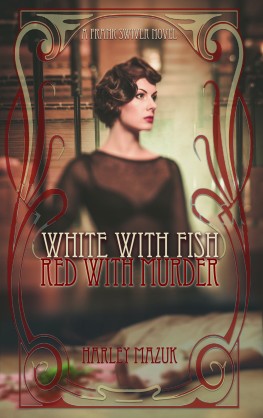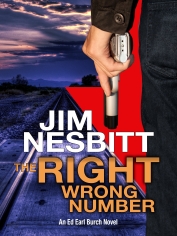 Title: WHITE WITH FISH, RED WITH MURDER
Title: WHITE WITH FISH, RED WITH MURDER
Genre: Mystery
Author: Harley Mazuk
Website: www.harleymazuk.com
Publisher: Driven Press
Purchase on Amazon
About the Book:
P.I. Frank Swiver accepts an invitation from a wealthy connoisseur to attend a wine tasting on a private rail car. The host, General Lloyd Thursby, entices Frank with an offer of much-needed work, and the other guests with the promise of a pour of a rare California wine, Ravensridge Blackbird Noir. On board, Frank, accompanied by his secretary and lover Vera Peregrino, finds an old flame, the recently widowed Cicilia O’Callaghan, among the guests. It turns out that Thursby wants Frank to investigate the murder of his good friend, Rusty O’Callaghan, Cicilia’s late husband. But all does not go as planned: General Thursby is murdered before the wine tasting has even begun. Locked into the private carriage and steaming north from San Francisco, the guests proceed to pull some corks and theorize who among them could be the killer. The cops arrest Vera for Thursby’s murder and while she languishes in her cell, Frank’s renewed affair with Cici heats up. But another murder follows and Frank realizes that his romance with Cici is poisonous. He’ll have to change his perceptions and find the real killer—or lose both Cici and Vera…and maybe even his life.
EXCERPT:
A few lights were on in the lounge; I could see burgundy wallpaper with dark wood trim. To my right were two dining tables, each with four seats, and on the left an upright piano with a light oak finish. Beyond that, a group of folks sat in the far end of the car. I led Vera partway down, until the man facing us spoke.
“Ah, you must be Frank Swiver,” he said.
“I am, and this is Vera Peregrino.” There were nods and greetings, and the man who had spoken rose. I strode across to shake his hand.
“Lloyd Thursby,” he said. He was an older gent with gray hair and clear, alert blue eyes. He wore a camel hair topcoat draped on his shoulders like a cape, over a dark brown, well-cut suit. He stood a couple of inches taller than me, maybe six foot two, and he carried himself ramrod straight, so he appeared even taller. I had the idea he was fit and powerful for his age. “This is my majordomo,” he gestured at a man standing near the rear corridor of the train car, “Fenwick.” He was younger and three or four inches shorter than Thursby.
Fenwick stepped forward. “I’ll take your bags, sir.”
I gave him my duffel and Vera’s suitcase, and when he reached out his arms to take them, his sleeves slid up, revealing thick, dark hair on the backs of his wrists and hands. He carried the luggage into the corridor, and his wrists stayed down out of his sleeves making his arms appear long and apelike.
General Thursby held out his left hand toward a dame in a chair on my right. “This is Sally DeBains.” She was well dressed and well coiffed, fiftyish, and blond—though I suspected the hair color came out of a bottle.
“How do you do?” she said. She had plenty of ice on her fingers, and I clasped the hand she extended and gave it a light kiss. I thought about biting one of the rings, but she didn’t strike me as a big Three Stooges fan.
“I’m well, thanks,” I replied. “How do you do?” More jewelry drooped around her neck, and she obviously had gained a couple of pounds as she aged. She may have been shaking her maracas a bit lower than she used to, but she had probably been a hot number twenty years ago. For my money, she was still hot enough.
Thursby stepped back toward his chair and extended his right hand. “Over here, allow me to present Marcus Aurelius Wolff, our philosopher, and a fellow collector.”
Wolff was a huge, fat man, whose bulk blocked much of the light from the window behind him. His three-piece charcoal pinstriped suit oozed polish and quality, and he held a pearl-gray hat in his lap. Although it was cool, and I still had my trench coat on, the fat man was perspiring. He beamed and drew a silk hanky out of his breast pocket, then wiped his bald head.
“An honor, sir, an honor to meet you,” said Wolff.
I assured him the honor was all mine. “A collector of what?” I asked.
“Why wine, Swiver, wine, of course.” Thursby laughed. “That’s what brings our little group together, you know. We taste wine, we savor it, we debate about it.”
“And what do you do, sir?” Wolff asked me.
“I drink it.” I gave him a grin.
Thursby stepped in. “Frank is a writer working on my biography.” Writer was as good as anything. General Thursby had enclosed a hand-written note with his invitation:
Swiver,
I hear you know a little about wine, but that’s not the only reason I’m inviting you to my tasting. I’d like to hire you. I’ll brief you about the job on the train. You can bring another operative if you like. Make it look as if you’re along for the party—I don’t want to tip my hand. Whether you take the case or not, I’ll pay you for your time and you’ll get to taste some good wines.
Thursby
That was all I knew; it wasn’t much, but it was enough to get me there. I hadn’t had a case for weeks, other than the contract work at the hotel, and I needed the money. He didn’t want to tip his hand. I would play along.
“Miss Peregrino is my research assistant,” I said. Vera smiled.
And so we circulated around the room and met the guests, and Vera and I shook hands like a couple of politicians at the Orange County Fair.
And then as the introductions were coming to an end, I saw her, to my left, by the piano. A short black dress, low cut, raven-dark hair, emerald eyes that almost glowed, over robust cheekbones—it was Cicilia Ricci, girl of my dreams.
“And last, this is Cicilia O’Callaghan,” the general went on. “Cicilia—”
“We’ve met.” A chill ran up my spine.
“Hello, Frank. It’s been a while.”
“Fourteen years. You look good, Cicilia.” The widow O’Callaghan, formerly Cicilia Ricci. Her hair was cut a little shorter than when I knew her—wavy on top, parted in the middle, and falling down to her shoulder blades in curls. Her dark eyebrows curved high over her big eyes in graceful roman arches. She’d been seventeen when I met her; she’d be thirty-two now. No longer a budding teenager but a woman in her prime, and more ravishing than ever, if that was possible.
“You look well too, Frank.” Her voice was deep, smoky, seductive. It was Cici’s normal voice.
I shook another Pall Mall out of the pack and fumbled with a box of wooden matches like a nine-year-old trying to light up in the schoolyard. “Having a little trouble, Frank?” Vera noticed. She tilted her head down and to her right, and angled an eye up at me, amused. She relieved me of the matches, struck one and held it out, steadying my hand as I lit up.
C’mon, Swiver, get a grip on yourself. You’re on a case. I clenched and unclenched my fists, and turned away from Cicilia to face the general.

 Title: THE RIGHT WRONG NUMBER
Title: THE RIGHT WRONG NUMBER